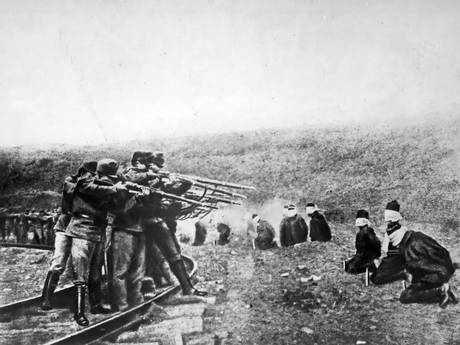Austria Attacks in Serbia; Russia in the Caucasus
Special to The Great War Project
(30 November-1 December) Austria takes Belgrade today a century ago.
Since the beginning of the war in early August, Austria-Hungary has but one crucial goal – to occupy Serbia and extract revenge for the killing of Austria’s heir-apparent, the Archduke Franz Ferdinand – the act that started the war.
The first invasion of tiny Serbia by the great Habsburg Empire was a disaster for Austria, a triumph for Serbia.
So the Austrians decide to do it again.
At first the current Austrian occupation of Belgrade looks successful. But the Serbs “continue to fight tenaciously,” writes historian Martin Gilbert, and Austria’s hold on the Serbian capital at this point looks tenuous.
Austria is also fighting a losing battle against the Russians in the Carpathian Mountains to the north, which weakens their hold on Serbia. “Rough Serbian terrain,” writes historian Michael Neiberg, “and a need to deal with the deteriorating situation in the Carpathians sowed confusion in the Austro-Hungarian ranks, thus opening a chance for Serbia to respond.”
Now another front in the war opens up – in the Caucasus…
…just to the east of the Black Sea. This will be the first serious clash between the Russians and the Turks.
Despite the sub-freezing temperatures in the Caucasus Mountains, the mixture of ethnic groups there acts like tinder for the fire.
“On the Turkish side sat the Christian Armenians,” observes historian Neiberg, “and on the Russian side sat many Turkish Central Asian peoples. Even if much of the official rhetoric – especially on the Russian side – proved to be empty, it nevertheless added fuel to a smoldering fire in wartime.”
The Russians move first. But this serves the plans of Enver Pasha, the Turkish minister of war. Enver is one of the key leaders of the Ottoman Empire, and he has conjured up the plans to take on the Russians in the Caucasus.
This is his reasoning: “It was far from the main areas of deployment of the Russian army in Poland,” writes war historian John Keegan, “therefore difficult to reinforce and already stripped of troops to fight the Germans and Austrians. It was of emotional significance to the Turks, as a homeland o fellow Muslims.”
Enver also believes it is a potential center of revolt against Russian rule.
Enver’s plan “envisages a dual-pronged offensive – of which the advance to the Suez Canal was one, that into the Caucasus the other – that would result in the raising of revolt in Egypt, Libya and the Sudan, and in Persia, Afghanistan, and Central Asia.”
It is a plan of epic proportions, but it is deeply flawed according to Keegan. For one thing, non-Muslim peoples make up the majority of those living in the Ottoman Empire.
And on strategic terms…
…“Enver was worse than thoughtless,” writes Keegan, “His decision was foolhardy.”
To attack in the Caucasus at the beginning of winter, during which temperatures descend to twenty degrees even in the lower passes and snow lies for six months, that is surely foolhardy.
Still, the Turkish plan is an initial success, drawing the Russians in, stretching their supply lines ever deeper into the narrow roads and mountain passes blocked by snow.
The Turkish successes will prove short-lived.


